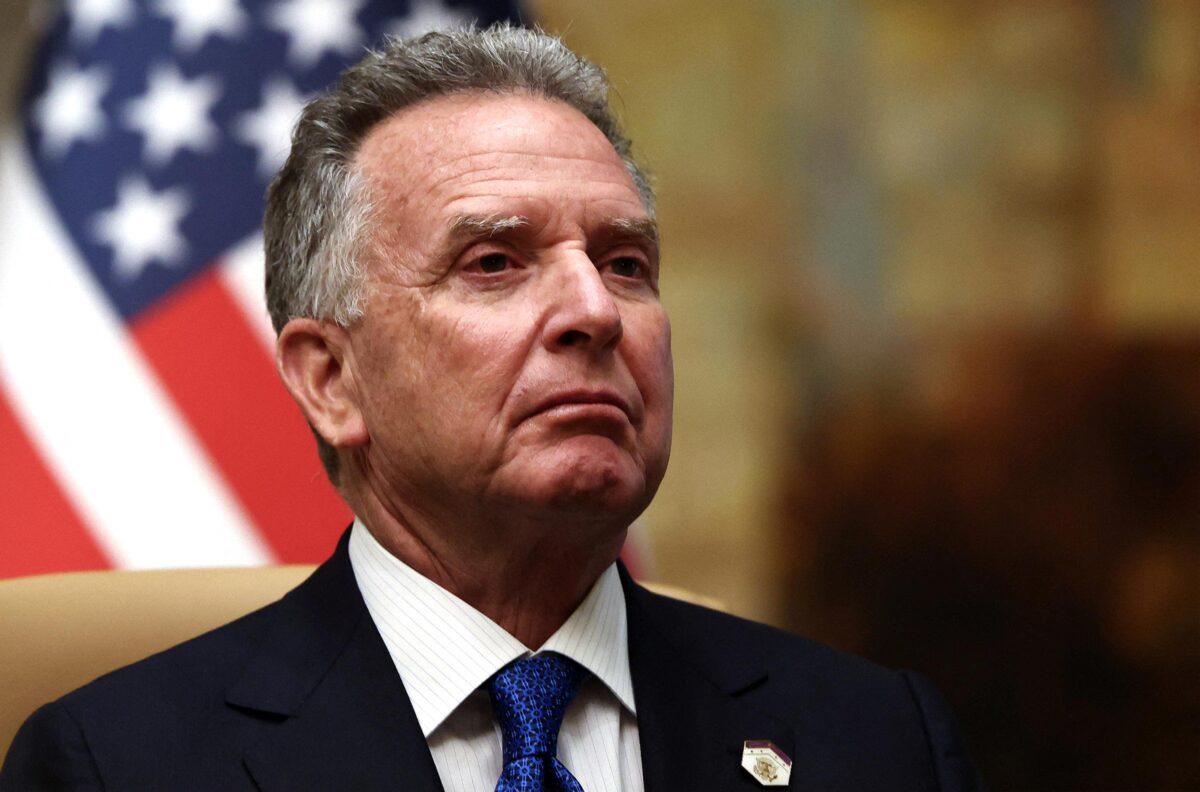Who is Witkoff and why is he central to the Israel-Gaza hostage deal?

US Middle East envoy Steve Witkoff attends interview after meeting with Russian officials at Diriyah Palace, in Riyadh, Saudi Arabia, on February 18. Image Credit: Evelyn Hockstein/Pool/Getty Images
Steve Witkoff, once known as a real estate magnate, is now thrust into the international spotlight as the U.S. Special Envoy to the Middle East. In recent days, he has become a central figure in the delicate ceasefire and hostage release deal between Israel and Hamas. But how did a real estate developer rise to this position? And what stakes does he carry as he addresses crowds in Tel Aviv and negotiates ceasefire maps in Doha?
What Is Witkoff’s Background and Rise to Power?
Steve Witkoff (born 1957) is the founder of the Witkoff Group, a prominent real estate development firm in the U.S. He holds a law degree and built a reputation in commercial real estate before entering politics. In 2025, President Donald Trump appointed him as Special Envoy to the Middle East, later expanding his role to Special Envoy for Peace Missions. His tenure is controversial: critics point to his lack of diplomatic experience, while supporters highlight his unconventional negotiation style.
What Is Witkoff’s Role in the Israel-Gaza Hostage Negotiations?
At the center of the current Gaza talks, Witkoff has emerged as a key mediator. He and Jared Kushner have been credited with spearheading the first phase of the ceasefire and facilitating the hostage exchange agreement.
He has traveled to Doha, Rome, and Qatar, pushing negotiations forward even amid deadlock. In Tel Aviv’s Hostages’ Square, he addressed thousands alongside Kushner, meeting with hostage families ahead of his speech.
READ ALSO
Gaza ceasefire deal: What’s next after phase one agreement?
Has Witkoff’s Presence Shifted Momentum?
Observers say his involvement signals increased U.S. commitment. Some key points:
- He recently boasted that the number of controversial points between Israel and Hamas had declined from four to one—an indicator of narrowing disagreements.
- He described U.S.–Iran talks as “promising,” suggesting his role also stretches beyond Gaza.
- His praise of President Trump at rallies has sparked mixed reactions; in Tel Aviv, many cheered his mention of Trump but booed the name Netanyahu.
Still, critics warn that relying on someone without diplomatic track record might backfire. The pressure is on for Witkoff to deliver.
What Are the Key Diplomatic Hurdles He Faces?
Despite progress, major obstacles remain:
- Mapping the IDF withdrawal lines remains hotly contested.
- Military withdrawal versus maintaining control is a point of friction.
- Managing expectations at Hostages’ Square is delicate, crowds demand quick results, while negotiations are complex.
What Did Witkoff Say at Hostages’ Square?
In Tel Aviv, Witkoff addressed thousands of Israelis gathered at Hostages’ Square. He honored hostage families, evoked emotions of hope, and tied his role to Trump’s broader peace initiatives. After touring the Gaza Strip with Israeli military and U.S. officials, he visited the Returning Hostages Center at Re’im Base.
What’s at Stake for Witkoff, the U.S., and the Region?
Witkoff is not a minor actor, his performance could define U.S. diplomacy in the Middle East:
- A successful deal would cement his status as a convincing negotiator.
- Failure or backlash may amplify criticism about bypassing seasoned foreign service professionals.
- His dual role negotiating in Gaza and working on U.S.–Iran dialogue suggests global ambitions.
FAQ
Q1: Who is Steve Witkoff?
Steve Witkoff is an American real estate developer turned diplomat. In 2025, he was appointed U.S. Special Envoy to the Middle East and later Special Envoy for Peace Missions.
Q2: What has Witkoff done in the Gaza–Israel negotiations?
Witkoff, alongside Jared Kushner, led the U.S. role in the hostage release and ceasefire deal. He has traveled between Doha, Rome, and Tel Aviv, engaged with hostage families, and publicly addressed rallies.
Q3: Why is his appointment controversial?
Critics cite his lack of diplomatic experience and ties to real estate and business. Supporters argue his business decisiveness is well suited for high-stakes negotiation.
Q4: Has Witkoff had measurable success so far?
He has helped reduce core negotiation issues and push forward a hostage exchange deal, points of contention reportedly dropped from four to one.
Q5: What are the major challenges ahead?
Key hurdles include mapping IDF withdrawal, balancing military control, meeting hostages’ release timelines, and managing public expectations under media scrutiny.
Q6: What did he say at Hostages’ Square?
He praised victims, urged unity, and placed emphasis on Trump’s role. The rally was emotional, some cheered Trump, others booed Netanyahu.
Q7: What diplomatic moves is Witkoff making beyond Gaza?
He has publicly commented on U.S.–Iran talks as “promising,” traveled to Europe for diplomatic meetings, and engaged in multi-country mediation efforts.
Q8: Is Witkoff’s influence growing within Trump’s foreign policy?
Yes. Coverage describes him as a rising central figure in Trump’s second-term diplomacy, especially given his roles in Ukraine, Russia, and now the Middle East.
Q9: When and where is he speaking next?
He is slated to address the Tel Aviv rally at Hostages’ Square later this evening, according to multiple sources.
Q10: How will we measure Witkoff’s success?
If hostages are safely released, a stable ceasefire holds, and diplomatic trust remains intact, he will be seen as effective. If negotiation breakdowns, leaks, or backlash occur, his legacy may be questioned.

